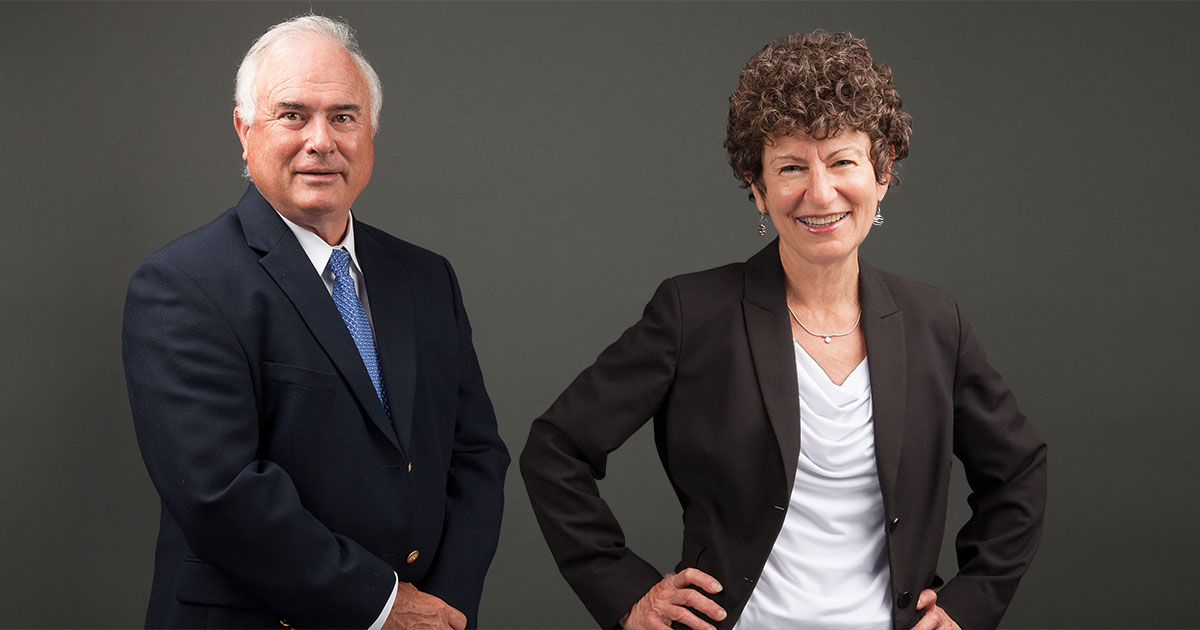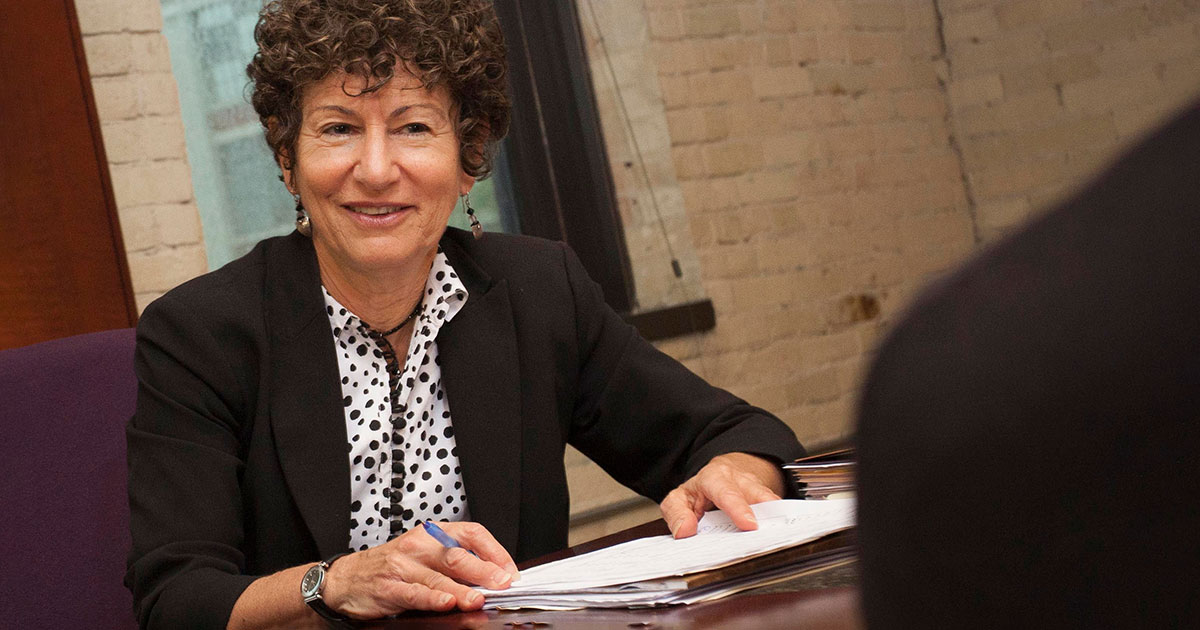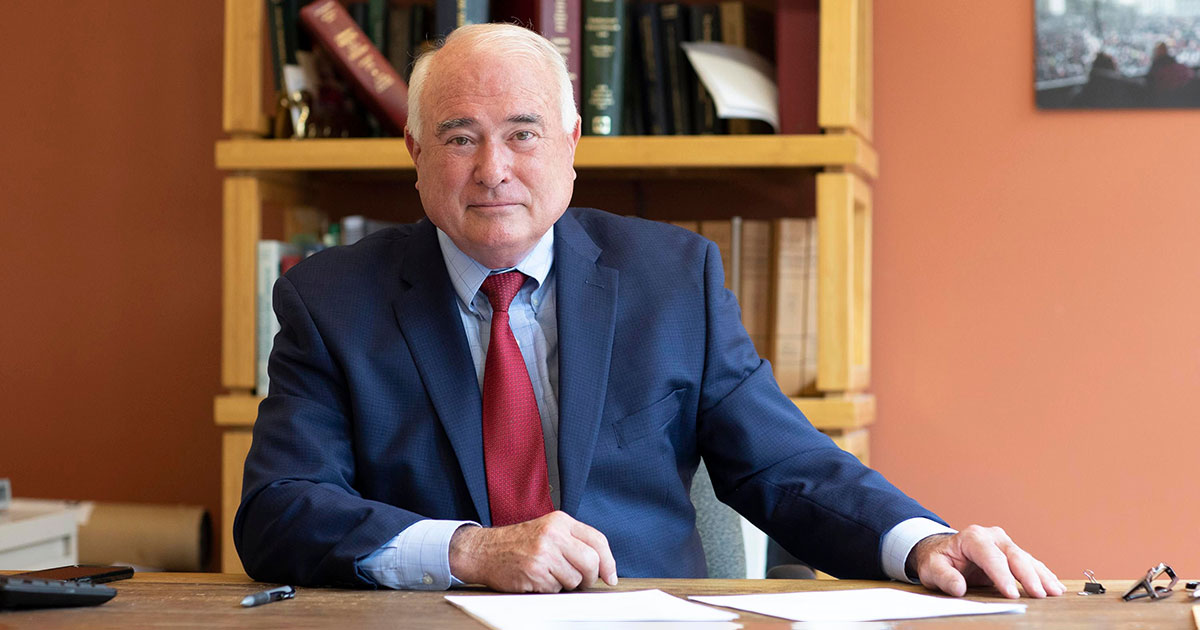
As I prepared to graduate from law school in the midst of the Great Recession, my decision to apply at labor and employment law firm Hawks Quindel, and the partners’ decision to offer me the position, changed the trajectory of my career and my life. Over the last 12 years, I have had the honor to work with and learn from attorneys Timothy Hawks and Barbara Quindel, both of whom will be officially retired as of Dec. 31, 2021.
Preparing for a Hawks Quindel firm without the Hawks or Quindel in active practice anymore seems almost unimaginable. I couldn’t pass up the opportunity to pick their brains once more. How have their careers surprised them? What are they most proud of? Who taught them the most? What do they know now that they wish they’d known early on? What advice do they have for other lawyers? Some of their responses surprised even me.
What is one of your most memorable or proudest moments from your career?
Timothy Hawks: In 1996, there was a series of cases, which Barbara co-counseled part of, that related to City of Milwaukee pensions. Strategically, it was a multilayered approach to the problem that included a federal court filing and subsequently, an interest arbitration. It ultimately resulted in all City of Milwaukee employees having a pension escalator. For the Milwaukee firefighters, and their families, the case was valued at $16 million. I was, and still am, proud of that case and how it played out strategically, but also the lasting legacy it provided for employees and their families.
 Summer H. Murshid, Georgetown 2009, is a shareholder in the Milwaukee office of Hawks Quindel s.c. She leads the Milwaukee office’s employment practice group and co-leads the firms’ wage and hour practice group. She is a member of the executive board of the National Employment Lawyers Association (NELA) and is a speaker and presenter on wage and hour and employment discrimination issues. Get to know the author: Check out Q&A below.
Summer H. Murshid, Georgetown 2009, is a shareholder in the Milwaukee office of Hawks Quindel s.c. She leads the Milwaukee office’s employment practice group and co-leads the firms’ wage and hour practice group. She is a member of the executive board of the National Employment Lawyers Association (NELA) and is a speaker and presenter on wage and hour and employment discrimination issues. Get to know the author: Check out Q&A below.
Barbara Quindel: Definitely the work I did as the Teamsters election monitor in the 1990s. I was so lucky to work with the team of people I had around me. I formed some lasting friendships that I still have today. The work was so memorable and we relied on each other so much for support, it’s the kind of experience that forges friendships through fire. It was very stimulating.
Act 10 changed the face of public sector labor in Wisconsin, which was your primary area of practice. What was that like for you?
Tim: I was really angry and I still am. I still don’t think people fully understand the lasting financial impact on public employees and their families. Unions and union membership over time became incrementally politically active, and I believe Act 10’s goal was to diminish that. In some respects, we are still dealing with the fallout of that.
Barbara: It changed everything, and I am still processing it, even after all these years.
What advice would you give your younger attorney self? What do you wish you had known then that you know now?
Tim: Bill contemporaneously or you will always be behind.
Barbara: You have to really examine every case carefully and individually so you make the right decision for the client and so you know when to settle or when to continue the fight. Sometimes younger lawyers get caught in the fight and forget that part of our job is about determining if resolution is a better option.

Did you have work-life balance and if so, what was your strategy to achieving that?
Tim: I wasn’t great at that and it was probably a mistake. It should definitely be a priority.
Barbara: Be home for dinner. It makes a big difference and it’s worth it.
What will you miss most about work in retirement?
Tim: Two things – the socialization (except for COVID-19) and the intellectual aspects of the practice of law. You learn something new almost all the time.
Barbara: Being attorneys is part of who we are, and it’s strange to close that chapter. It takes some getting used to and adjustment to realize you don’t have to get up and go in every day. Sometimes I miss having a place to go.
The Author’s Takeaways
You learn a lot about people by observing them: in the quiet moments when they are thinking about their next question for cross-examination, when they are responding to a client question, when they are confronting a difficult opposing attorney, when you are traveling together to northern Wisconsin, or when they are providing you with constructive criticism. These are the moments that forge friendships, shape careers, and teach valuable skills. While it’s hard to distill 12 years of lessons into one article, there are a few takeaways that have emerged as central to Barbara’s and Tim’s practices.
The Team Matters
Who you have by your side through the wins, and especially through the losses, makes all the difference. As I talked through their careers with them, both Barbara and Tim talked about their work in terms of who they worked with on the case. While the substantive work is important, the company you keep and who supports you matter the most. I don’t know if our firm would have survived as well as we did after Act 10 if those internal relationships hadn’t been on solid footing. Late nights, high stress, existential challenges to practice areas, and 80-hour work weeks are hard enough. Sometimes the only thing that gets you through is the cup of coffee or lunchtime walk with a colleague. That comradery is something Barbara and Tim have always made time for, and it shows in the strength of their working relationships.

Listen
Barbara Quindel is a very talented attorney and legal mind, but one of the most important things she taught me is how to listen. It didn’t matter how frustrated I was with our discussion, how heated a client got in a meeting, or how lively union members were during a meeting, Barbara listened, processed, and then responded. She is thoughtful and deliberate in her responses, which is not a usual trait for many lawyers. Most of the time, lawyers (and perhaps humans in general) are thinking about what they are going to say next. This is especially true for lawyers because they are processing information and must be thinking about how to respond almost instantaneously with the next question or response. Scaling back on that instinct, and resisting the urge to provide a quick-fire answer to everything, is a life lesson I still have not mastered; I continue to strive toward the “Barbara level” of listening. I will miss having her around to model that for me and for everyone at our firm.
It’s Okay to Let It Go
Early in my career, I had a client in which I invested a significant amount of time and emotional energy; I was heavily involved with the client and the case, which, after a year, finally resolved (on the morning of the hearing). We drafted a settlement agreement, and I sent it to the client to review. I emailed and followed up several times and the client did not respond to me. We had spent a year in virtual constant contact, and it felt like I was being ghosted. Turns out, the client had emailed Tim Hawks to complain about me and how the settlement was allocated. I was beside myself with anger. After everything I had done! (Read in an indignant, childish tone.) Tim walked in and let me vent (for a long time). He nodded and said he understood my frustration but that it was okay to let it go. I looked at him like he was crazy. Summer, he said, it’s really okay to just let it go. It seems like a small amount of money for you but it’s about the principle for this client. And, he said, you should just let it go because money isn’t worth having an angry client in the world or the aggravation that comes hand in hand with that angry client.
This would turn out to be one of my most valuable lessons, and I still tell all of my new associates about this lesson whenever possible. I was lucky enough to learn it in my early years, and I am sure it saved me a lot of aggravation.
The Legacy Continues
For 20 years, Barbara and Tim talked about merging their respective law firms to combine forces for Wisconsin workers and unions, which finally happened in 2005. The shared commitment to seeking economic, social, and racial justice for Wisconsin workers proved to be the bond that tied everyone together.
Over the years, Hawks Quindel has grown to five offices and 32 attorneys. Though many of the seasoned attorneys have retired over the last few years and some will do so this year as well, a new generation of dedicated advocates follows in their footsteps. I asked Barbara what advice she had for Hawks Quindel as it moved to its new chapter. “Don’t be too hard on yourselves and keep fighting the good fight.”
Meet Our Contributors
If you could get free tickets to any event, what would it be?
 If I could pick free tickets to any event, it would be to see “Hamilton” (again). I know it’s terribly trendy and a little bit of a cliché, but the first time I went to see it I was so astonished by the concept and cleverness that I didn’t get to entirely enjoy the performances and artists themselves. I would love to watch it from a different perspective. Plus, now that I know all the words to every song, I can sing along, which I’m sure everyone around me will love!
If I could pick free tickets to any event, it would be to see “Hamilton” (again). I know it’s terribly trendy and a little bit of a cliché, but the first time I went to see it I was so astonished by the concept and cleverness that I didn’t get to entirely enjoy the performances and artists themselves. I would love to watch it from a different perspective. Plus, now that I know all the words to every song, I can sing along, which I’m sure everyone around me will love!
Summer H. Murshid, Hawks Quindel s.c., Milwaukee.
Become a contributor! Are you working on an interesting case? Have a practice tip to share? There are several ways to contribute to Wisconsin Lawyer. To discuss a topic idea, contact Managing Editor Karlé Lester at (800) 444-9404, ext. 6127, or email klester@wisbar.org. Check out our writing and submission guidelines.
» Cite this article: 94 Wis. Law. 39-41 (November 2021).
